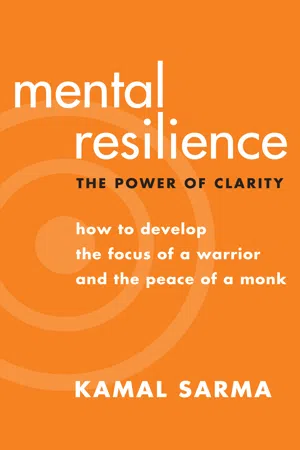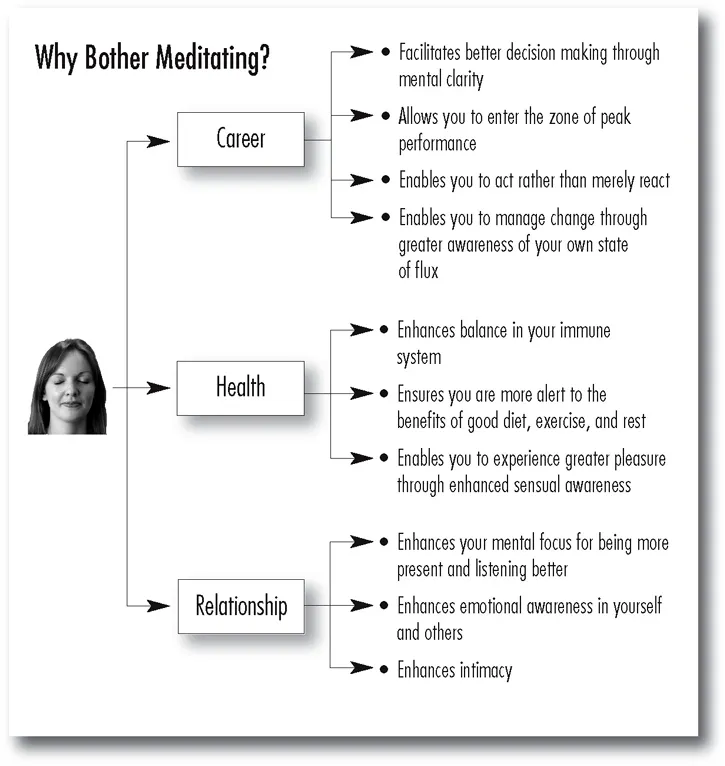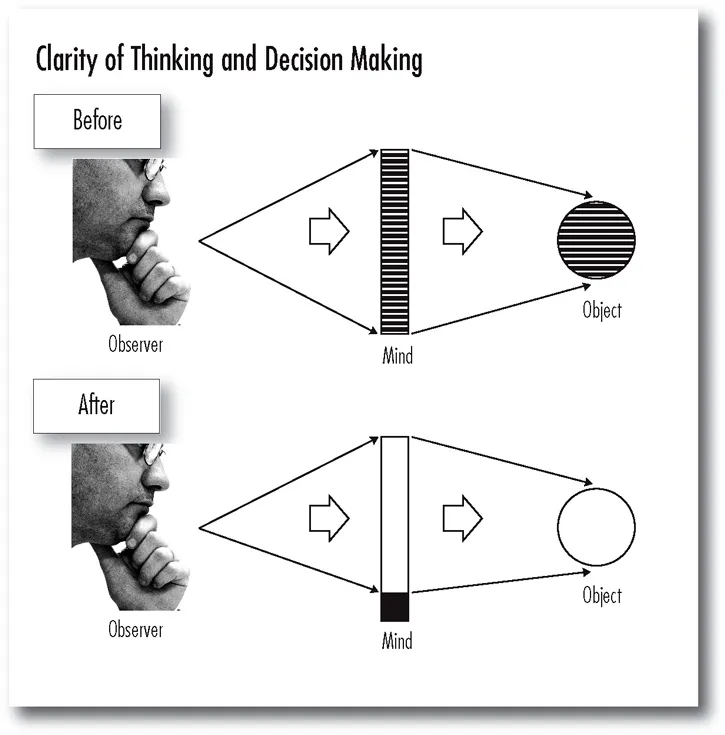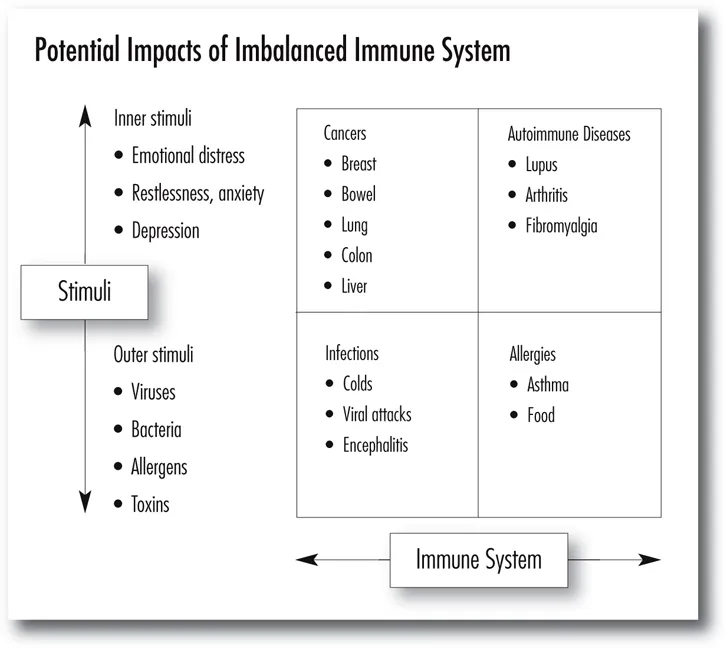![]()
PART ONE
theory
If I had eight hours to chop down a tree, I’d spend six hours sharpening my axe.
ABRAHAM LINCOLN
![]()
CHAPTER ONE
meditation — why bother?
Everything is changing; let go a little at a time and breathe new life into your old ways of thinking and feeling. Let not fear be a complete barrier to the unknown.
ANONYMOUS
MOST PEOPLE COME TO MEDITATION thinking, or even fearing, that it is difficult. No matter how much some people rave about the benefits of meditation, many think it would be easier to relax by merely playing a sport, reading a book, grabbing a drink, watching TV, or doing any number of things that don’t require much effort.
Meditation does require some effort, or personal discipline, and it takes up the most precious commodity in our lives — time. Yet, to derive all of the benefits takes practice. So why go to all the trouble of learning to meditate? Isn’t it all too hard? The short answer is that learning to meditate will invariably help your well-being. One of the best answers is that you will feel the benefits almost immediately, which is definitely one of the greatest aspects of meditation. I like to think of meditation as an insurance policy to protect your most precious asset — your mind.
The Benefits of Meditation
The core benefit of meditation is that it’s a proven way to truly rest and clear your mind. We know how important it is to rest our body. We could not keep going for days on end without resting. We do not work most machines continuously without giving them a rest, for fear they might heat up and explode. But somehow, when it comes to resting our minds, we imagine the same laws don’t apply.
Most people consider sleep to be the best way to rest and rejuvenate their minds. But a growing problem in today’s world is that sleep does not equal rest for many people. And the lack of mental rest is not merely caused by lack of sleep, because when we sleep, we keep processing information from the day or other issues that needed but did not get our attention. In essence, we still use our minds during sleep. It is not easy to give the mind the real rest it craves.
We also have the notion that we can rest our minds when we go on vacation or just take time away from our normal life. How many times have you been on vacation, sitting on a lovely beach or walking in the green hills somewhere, when suddenly — pop! — up comes some worry or concern? How often has the stress of day-to-day life reemerged in your head the minute your relaxing vacation was over?
What is happening is that — despite attempts to relax, distract, and slow down — the mind still processes problems in your conscious and unconscious spheres. To truly stop the clutter and “traffic,” we need to control our flow of thoughts and our brain waves. Meditation is a way to do just that. Through meditation we develop the skills and power to relax and clear our minds, and through this comes rest and a great many more benefits.
What would you say if I told you that by practicing meditation you could have the following benefits?
• Improved career performance and prospects
• Better health in body and mind
• Enhanced love life!
I imagine that some of you might smile and thank me, while thinking, “Yeah, sure; how gullible do you think I am?” Well, it is true. For centuries warriors and monks alike have recognized the benefits of meditation. Today, contemporary health and medical professionals are confirming their assertions.
How Meditation Can Help Your Career
Many of us are paid to use our minds to add value to the organizations and communities we work in. To do this, we must have the clarity to make better decisions and the ability to focus our minds to the task at hand, so that we use more of our mental capacities. By actively training in these two areas, we can enhance our careers and offer more value.
Better Decision-Making Skills
It is in moments of decision making when we add or destroy value to ourselves and the people around us. The decisions may be large or small, but theoretically, for each of them, we gather as much information as we can, analyze that information, weigh our options, and make a decision. Some decisions may involve spending vast sums of money that carry huge consequences for the lives and livelihoods of many people. Other decisions might concern how to better serve a client’s needs.
If you work in the medical profession or in law enforcement, your decisions sometimes involve life and death. And, astonishingly, these decisions often need to be made rapidly, sometimes in a matter of minutes or seconds.
The most important factor in effective and sound decision making is clarity of mind. If your mind is full of mental noise or distracting thoughts, then it will have to work harder, and take longer, to process information and make decisions. Additionally, if you have unconstructive emotions bubbling up inside you, your mind will likely feel fatigued, and your decisions won’t necessarily be congruent with your internal values. Instead, your decisions will be based on the mental clutter whirring around in your mind.
In the “Before” phase of the illustration above, the thinker’s mind is full of mental chatter. As a result, he can’t clearly perceive the object at hand. By contrast, with Mental Resilience Training he is able to settle his mind and focus effectively on the object to make an insightful and effective decision.
Once you establish a sustained meditation practice, you become aware of the mental chatter and more adept at clearing it. You have the tools to develop some space to perceive a situation with greater clarity before you make any crucial decisions. The time you need to create this mental space is not hours or days; it is, literally, a few moments.
Enhanced Ability to Focus
Through the discipline of learning to focus on a single point, you will gain the skills to do your best work. Many athletes speak of entering a zone of peak performance where they are deeply attuned to whatever they need to do: hit or catch the ball, vault over a pole, or run a track. Meditation can help you harness mental energy so that you reach such a zone where you become focused. And you can do it with relative ease.
Similarly, if you have confidence in your ability to enter that zone of peak performance by bringing all of your mental energy to one precise point (for a customer, presentation, or report), you can be certain that you are using your maximum mental capacity. You will have hit that sweet spot of your own intellect.
A very important benefit of learning to focus is that, when you go home, even after a grueling workday, you will be able to compartmentalize and ensure that your mind is fully present and clear for your loved ones rather than remaining preoccupied with solving work issues. Other aspects of meditation’s benefits will be covered in later chapters. Here, it is sufficient to say that meditation will enable you to gain the following skills:
• Act rather than react.
• Manage change through greater awareness of your own state of flux.
The Health Benefits of Meditation
Our minds are the biggest contributors to our physiological well-being. If we are mentally resilient we can manage our stress and truly give our bodies what they require, not through willpower, which can wax and wane, but through clarity, which gets stronger and stronger over time.
Stress Reduction
Stress is detrimental to our health. The New England Journal of Medicine states that “managing the long-term effects of the physiological responses to stress” is critical to survival.1 Stress attacks nearly every major system in our bodies, creating myriad health problems including diabetes, high blood pressure, stroke, allergies, asthma, and colitis, to name a few; and is, reportedly, implicated in 85 percent of all medical problems. An indication of this simmering health crisis is the increase in the number of lawsuits brought against companies by employees affected by stress-related illnesses. Employers are now even more aware than in the past of their duty to provide stress-management techniques to employees who deal with stressful situations as part of their work.
Stress is not all bad. In fact, it is an important part of everyday functioning. It stimulates the body for action and, indirectly, has helped the human race survive. Our metabolism reacts to outside stimuli with a fight-or-flight response, and in this way, stress enables us to survive.2
When we feel stress, our body releases hormones like adrenaline. We may be reacting to physical or mental threats: if a boss criticizes us, for example, we may respond physiologically in exactly the same way that we did in prehistoric times when trying to escape the jaws of a particularly ravenous carnivore. Now, of course, hitting your boss on the head, which could be a strongly career-limiting move, or running like crazy, which could decrease your likelihood of getting paid, would not be appropriate reactions. But the released hormones do get our metabolism racing, and if the physical threat were real, such a response could save our lives.
So, it’s important to know that not all stress is detrimental. But, like most things in life, you can overdo any good thing. And, most of the time, our response is inappropriate to the threat. If you are stressed for a long period because of work pressures, a demanding partner or children, and financial worries, your fight-or-flight responses start to attack your own body. The automatic mechanism built to defend your body now starts damaging it by blocking your arteries, knocking out your immune system, and overloading your endocrine system until, one day, you succumb to a cold if you are lucky or a serious illness if you’re not.
Stress hormones act as painkillers. This analgesic effect explains stories we have heard of athletes who kept playing their games despite injury, unaware that they may have even broken bones or sustained other harm. Sometimes it isn’t until hours later that they realize the extent of the damage and begin to experience the depth of the pain.
This happens in daily life as well. We work tirelessly throughout the day, ignoring our feelings. When feeling tired, we may pump ourselves up with that double shot of espresso. When we get headaches, we take painkillers. We take an antacid for an upset stomach. All the time, we ignore the signs of stress and simply treat its symptoms. But one day, the body may react violently with a serious illness such as heart attack, cancer, infection, or depression. If the immune system is out of balance, we suffer disease. So how can we avoid this?
Clinical studies have shown that meditation enables the immune system, our main defense against illness, to return to balance. The following table outlines some of the illnesses that result from an immune system that is out of balance. For example, if you have an inner stimulus such as emotional distress combined with an underactive immune system, you are particularly susceptible to getting cancer. You are more prone to suffer from autoimmune diseases (such as lupus or arthritis) if you have an overactive immune system.3 (I am asserting not that meditation will prevent these ailments but rather that people who are less stressed and have balanced immune systems may have a better chance of staying well and resisting the onset of these diseases.)
Through Mental Resilience Training we develop the mental muscles to deeply rest the mind. We start clearing it of all the stressful thoughts that move through it, day in and day out. The rested mind allows the body to come back into harmony and the immune system to find a healthy balance.
Clinical Research Supporting Mental Resilience Training
There has been significant medical research on the benefits of the meditative aspects of Mental Resilience Training. While meditation practitioners have known the effects for centuries, only recently have scientific investigations given credence to these ancient claims. I have summarized some of this research here, but these findings are just the tip of the iceberg.
The Power of Attention
Indian researcher and professor B.K. Anand found that yogis could meditate themselves into trances so deep that they didn’t react when hot test tubes were pressed against their arms. He also found that they could regulate their heartbeats at will.4...



